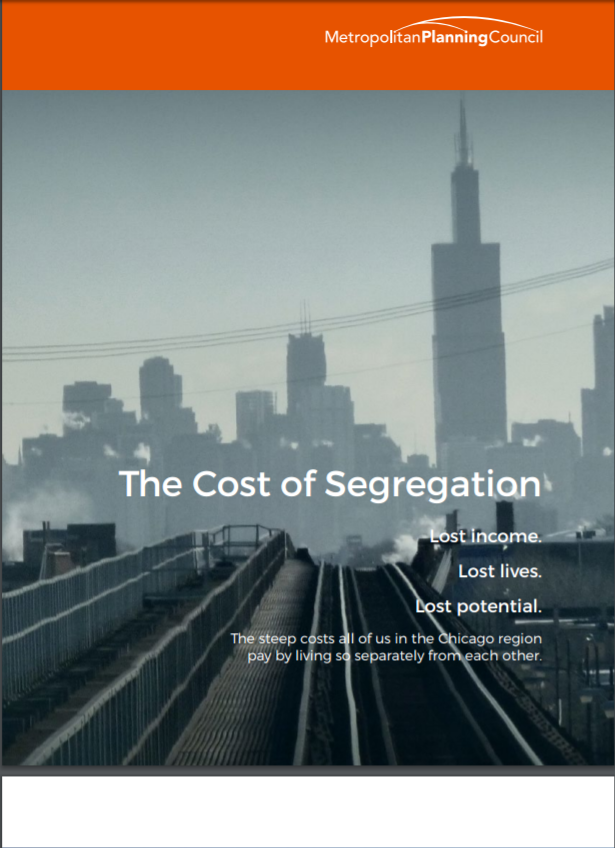By Kendra Freeman –
Growing up in Chicago, I learned about segregation at an early age. My education came riding the ‘L’ from 95th street north to the Loop and to different neighborhoods on the north and west sides of the city and suburbs. It’s a lesson natives and transplants learn quickly as riders shift from black and brown to white at specific stops almost as if cued by an offstage director.
 The Metropolitan Planning Council (MPC), where I work as a manager of housing and community development, recently released the results of a study to measure the cost of economic and racial segregation to the Chicago region. The results were not surprising. Segregation is costing us billions in lost income, lost lives and lost potential. Maintaining the status quo comes with a hefty price tag. Over 4 billion in lost earnings for African Americans, a 30 percent higher homicide rate and 83,000 fewer college graduates in the region. While the results may feel intuitive in a region with glaring racial boundaries, there has not previously been a shared acknowledgement that living so separately by income and race is a problem that has consequences for all. The findings are a strong reminder of the old adage: when one part suffers every part suffers with it.
The Metropolitan Planning Council (MPC), where I work as a manager of housing and community development, recently released the results of a study to measure the cost of economic and racial segregation to the Chicago region. The results were not surprising. Segregation is costing us billions in lost income, lost lives and lost potential. Maintaining the status quo comes with a hefty price tag. Over 4 billion in lost earnings for African Americans, a 30 percent higher homicide rate and 83,000 fewer college graduates in the region. While the results may feel intuitive in a region with glaring racial boundaries, there has not previously been a shared acknowledgement that living so separately by income and race is a problem that has consequences for all. The findings are a strong reminder of the old adage: when one part suffers every part suffers with it.
The report was part of a broader analysis of 100 metropolitan regions completed by the Urban Institute. Compellingly, the strong relationship of lost income, higher murder rates and fewer college graduates occur in regions with high segregation between African Americans and whites. Metro areas with moderate levels of segregation (closer to the median or 50th ranking) include Atlanta, Houston, and Memphis. But integration does not magically create equity. In 2012, the Metro Atlanta Equity Atlas ranked the region highest for income inequity among major US cities. Memphis, while more racially integrated has higher levels of economic segregation. While these metros are more racially integrated they are still grappling with significant disparities between rich and poor and black and white.
Integration itself is not a magic bullet. The hierarchy of class in mixed communities often plays out in ways that are less than equitable. I experienced this firsthand while leading the resident services division of an affordable housing development organization. Homeowners maintained power through homeowner associations and dominated decision making at mixed income developments. Better living environments did not equate to increased income and wealth building for low- and moderate-income households. Underemployed workers traveled farther to find work and made expensive commutes. Our clients who were now able to walk to work were walking to minimum wage jobs that enabled them to barely pay bills but not gain or build wealth. Large employers moving back to the city demand highly skilled employees and rarely provide opportunities for workers that are not college educated.
Building equity is a deliberate practice. It begins when we honestly evaluate structural inequities and create opportunities to correct them through institutional change. Community land trusts and associations that share decision making between owners and renters are vehicles to redistribute traditional allocations of power. Strategies that compel new and existing anchor employers to invest in community focused training; hiring and purchasing can create career paths and entrepreneurial ventures that increase incomes and build wealth. Understanding how the divisions of race and class influence our progress on economic mobility, the development of a skilled workforce and regional growth and stability is pivotal to foster inclusive and equitable neighborhoods. As MPC explores solutions to address the Cost of Segregation, we will address segregation and inequity knowing to truly move the needle we must give attention to both.
In February, the Strong Prosperous and Resilient Communities Challenge (SPARCC) named six cities for targeted investments that lead to equitable and healthy opportunities for all. Chicago, Memphis and Atlanta were among them. Each city has different environments where transit systems play a pivotal role in connecting communities and driving economic growth. If transit and the resources surrounding it are not managed equitably it will accelerate displacement in some places and continue disinvestment in others.
As L-Evated Chicago begins our work as part of SPARCC, we are embracing this moment of accepting racial inequity as a prominent problem in our region that affects the quality of life of all residents. We are hopeful this moment, coupled with community driven strategic investments at the national and local level, will ignite the spark that will fuel sustainable change in how we view and practice community development.
These days when I ride the ‘L’ I see the same patterns of racial and economic segregation that were present in my childhood. However, I’m hopeful to be part of a network striving to create a new model of community development that is both inclusive and equitable. I hope the ‘L’ will one day be the vehicle that connects people to opportunity and strong communities in all directions. I am hopeful that is the legacy we can leave the next generation of children riding the train.
Kendra Freeman is a Manager at the Metropolitan Planning Council in Chicago.